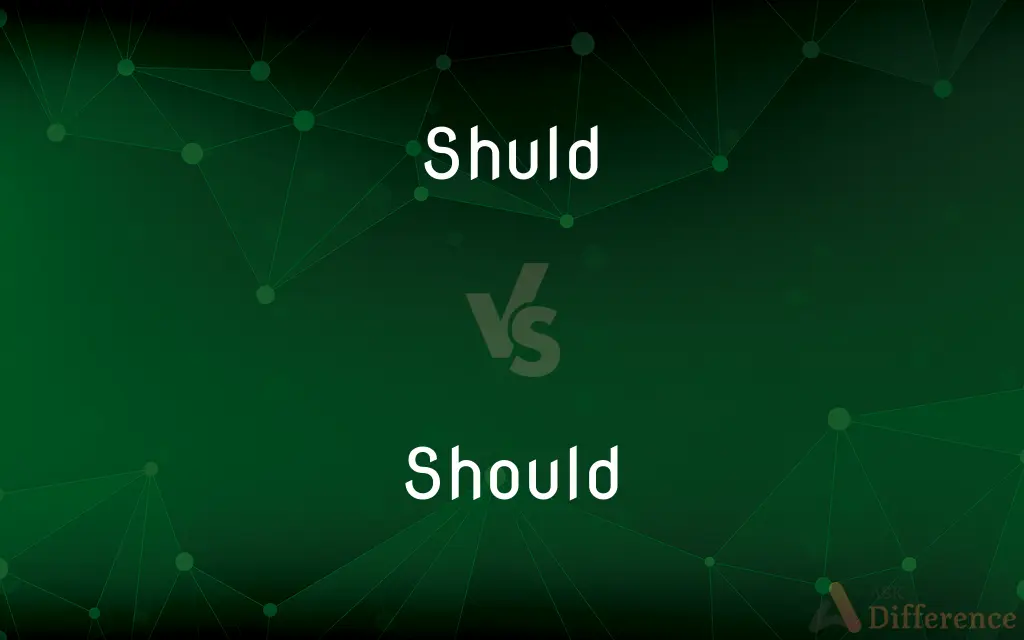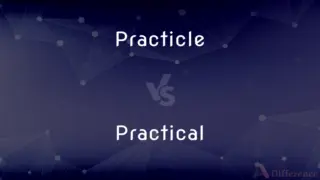Shuld vs. Should — Which is Correct Spelling?
By Tayyaba Rehman — Updated on March 31, 2024
"Shuld" is an incorrect spelling, while "Should" is correct, used to indicate obligation, duty, or correctness.

Table of Contents
Which is correct: Shuld or Should
How to spell Should?

Shuld
Incorrect Spelling

Should
Correct Spelling
ADVERTISEMENT
Key Differences
"Should" has the word "hold" in it, just without the "h."
Remember it as the past tense of "shall."
Think of "shoulder" – carrying the weight of obligation.
In English, "should" has been the historically consistent spelling.
Recall common phrases like "should've" or "shouldn't" for context.
ADVERTISEMENT
How Do You Spell Should Correctly?
Incorrect: She shuld call her friend to apologize.
Correct: She should call her friend to apologize.
Incorrect: You shuld check the weather before you leave.
Correct: You should check the weather before you leave.
Incorrect: They shuld have arrived by now.
Correct: They should have arrived by now.
Incorrect: We shuld consider going to the new restaurant.
Correct: We should consider going to the new restaurant.
Incorrect: He thinks he shuld start exercising more.
Correct: He thinks he should start exercising more.
Should Definitions
Used to indicate obligation or duty
You should brush your teeth daily.
Suggesting a certain action is likely or expected
He should arrive by 10 am.
Denoting a theoretical or expected condition
This should be the right location.
Expressing a polite request or suggestion
Should you see her, please pass the message.
Indicating a conditional state
Should it rain, we won't go out.
(auxiliary) Ought to; indicating opinion, advice, or instruction, about what is required or desirable.
Used to issue an instruction (traditionally seen as carrying less force of authority than alternatives such as 'shall' or 'must').
You should never drink and drive.
The law is clear that you should always wear a seat belt.
The manual says that this switch should be in the 'off' position.
Used to give advice or opinion that an action is, or would have been, beneficial or desirable.
You should go and see that film. I think you'll enjoy it.
I should exercise more often, but I’m too lazy.
She should not have been so rude.
(informal) With verbs such as 'see' or 'hear', usually in the second person, used to point out something remarkable in either a good or bad way.
You should see his new apartment. It's like a palace!
If you think her piano playing is bad, you should hear her sing!
In questions, asks what is correct, proper, desirable, etc.
What do you think? What should I do?
(auxiliary) Ought to; expressing expectation.
Indicates that something is expected to have happened or to be the case now.
They should have finished by now; I'll call them to check.
My fruit trees should be in flower, but the cold spring has set them back.
Will be likely to (become or do something); indicates a degree of possibility or probability that the stated thing will happen or be true in the future.
They should have it finished by Friday.
When you press this button, the pilot flame should ignite.
You should be warm enough with that coat.
Used to form a variant of the present subjunctive, expressing a state or action that is hypothetical, potential, mandated, etc.
If I should be late, go without me.
Should you need extra blankets, you will find them in the closet.
The man demanded that he should be allowed entry.
I'm surprised that he should say that.
(auxiliary) cap=1.
I told him that I should be busy tomorrow.
(auxiliary) An alternative to would with first person subjects.
Used to express a conditional outcome.
If I had not been so tired, I should have laughed heartily.
Used to impart a tentative, conjectural or polite nuance.
I should imagine that they have arrived by now.
I should think you would apologize.
Used to express what the speaker would do in another person's situation, as a means of giving a suggestion or recommendation.
It's disgraceful the way that they've treated you. I should write and complain.
To make a statement of what ought to be true, as opposed to reality. en
Something that ought to be the case as opposed to already being the case.
Used as an auxiliary verb, to express a conditional or contingent act or state, or as a supposition of an actual fact; also, to express moral obligation (see Shall); e. g.: they should have come last week; if I should go; I should think you could go.
Should Meaning in a Sentence
You should apologize when you hurt someone's feelings.
You should always brush your teeth before bed.
Should I bring an umbrella today?
We should save some money for emergencies.
She should drink more water to stay hydrated.
They should study more if they want to pass the test.
You should wear a helmet when riding a bike.
You should check your email regularly.
You should follow the instructions carefully.
She should take a break if she's feeling tired.
He should try to be more punctual.
Should we go to the park this afternoon?
You should try to be more optimistic.
We should enjoy the little things in life.
They should respect other people's opinions.
She should organize her desk.
You should be careful when crossing the street.
We should avoid eating junk food.
They should keep their promises.
You should visit the dentist twice a year.
Should I make a reservation for dinner?
We should help those in need.
He should improve his handwriting.
They should turn off the lights before leaving.
He should call his parents more often.
Should Idioms & Phrases
As one should
Doing something as it is expected or required.
She apologized for her mistake, as one should.
No more than one should
Not doing more than is necessary or expected.
He eats healthily, no more than one should.
Common Curiosities
What is the verb form of Should?
Should is a modal auxiliary verb.
What is the pronunciation of Should?
It is pronounced as /ʃʊd/.
Why is it called Should?
Should is derived from the Old English word "sceolde," which is the past tense of "shall."
Which vowel is used before Should?
No specific vowel is typically used before "should."
What is the root word of Should?
The root is "shall."
What is the singular form of Should?
Should does not have singular or plural forms; it remains "should."
Which conjunction is used with Should?
There isn't a specific conjunction exclusively used with "should." It can be used with various conjunctions like "and," "but," or "or."
Which article is used with Should?
Modal verbs like "should" don't typically have articles directly before them.
Is Should a noun or adjective?
Should is a modal verb.
Is Should a negative or positive word?
"Should" is neutral; its positive or negative connotation depends on context.
Is Should a countable noun?
No, "should" is not a noun.
Is Should a collective noun?
No, "should" is not a collective noun.
Is Should an adverb?
No, "should" is not an adverb.
Is Should a vowel or consonant?
"Should" is a word, not a single letter, so it contains both vowels and consonants.
How do we divide Should into syllables?
Should is one syllable, so it doesn't divide further.
What is the plural form of Should?
As stated, "should" does not change for number.
Which preposition is used with Should?
Various prepositions can follow "should" depending on context, such as "should to" or "should for."
Is the Should term a metaphor?
No, "should" in itself is not a metaphor.
Is the word “Should” a Direct object or an Indirect object?
"Should" is neither; it's a modal verb.
What is another term for Should?
An alternative might be "ought to."
Is the word Should is imperative?
No, "should" expresses obligation or likelihood, not a command.
Is the word Should is Gerund?
No, "should" is not a gerund.
How many syllables are in Should?
Should has one syllable.
Which determiner is used with Should?
Modal verbs like "should" don't typically take determiners directly.
What is the second form of Should?
Modal verbs don't have traditional verb forms, so there's no second form.
Is Should an abstract noun?
No, "should" is not an abstract noun.
What is a stressed syllable in Should?
The entire word "should" is a single stressed syllable.
What part of speech is Should?
Should is a modal auxiliary verb.
What is the opposite of Should?
"Should not" or "shouldn't."
What is the first form of Should?
"Should" is a modal verb and does not have conventional verb forms. The base verb is "shall."
What is the third form of Should?
Again, modal verbs don't have these forms.
How is Should used in a sentence?
"You should eat your vegetables if you want to stay healthy."
Share Your Discovery

Previous Comparison
Practicle vs. Practical
Next Comparison
Comemorate vs. CommemorateAuthor Spotlight
Written by
Tayyaba RehmanTayyaba Rehman is a distinguished writer, currently serving as a primary contributor to askdifference.com. As a researcher in semantics and etymology, Tayyaba's passion for the complexity of languages and their distinctions has found a perfect home on the platform. Tayyaba delves into the intricacies of language, distinguishing between commonly confused words and phrases, thereby providing clarity for readers worldwide.












































